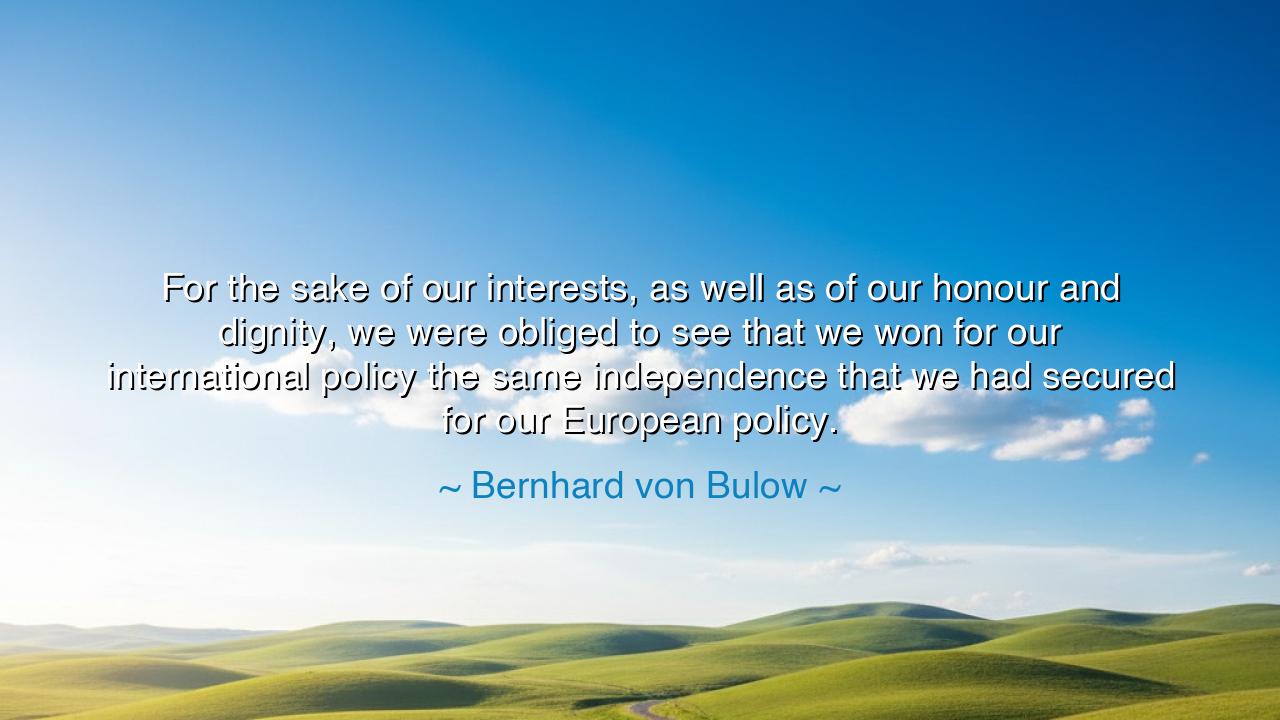
For the sake of our interests, as well as of our honour and
For the sake of our interests, as well as of our honour and dignity, we were obliged to see that we won for our international policy the same independence that we had secured for our European policy.






Listen, O children of the future, to the profound words of Bernhard von Bülow, a statesman whose vision of independence and honor resounded through the halls of history. "For the sake of our interests, as well as of our honour and dignity, we were obliged to see that we won for our international policy the same independence that we had secured for our European policy." These words carry with them a mighty truth—the truth that independence is not only a right to be fought for on the battlefield, but a cause to be upheld in all corners of life, including the vast, intricate arena of international relations.
In ancient times, great empires rose and fell not merely on the strength of their armies, but on the clarity of their vision. Rome, the eternal city, knew well that its power did not solely reside in the might of its legions but in its ability to shape its relationships with other nations. The Roman Empire was built upon the understanding that, to secure its future, it must maintain a policy of self-determination, both within its borders and on the world stage. It was independence—not the isolation of the empire, but the freedom to govern its actions and align its fate with its interests—that made Rome a power like no other. Bülow, in his own time, understood this truth deeply.
The independence of Germany, in the late 19th and early 20th centuries, was forged in the fires of both internal unity and the need to establish a voice in the international community. The unification of Germany, under Otto von Bismarck, was the embodiment of the dream to create a strong, unified nation-state that could stand alongside the great powers of Europe. Yet, the challenge did not end with the unification of Germany’s internal affairs. To secure Germany’s future, it was not enough to be strong within; it needed to maintain an independent foreign policy that could ensure its survival and honor in a world dominated by older, more established powers.
Look to the Prussian wars, where Bismarck masterfully maneuvered Germany’s political independence on the European stage. Through calculated diplomacy and strategic alliances, Germany sought to ensure that its interests were protected from external threats, while asserting its dignity on the world stage. Bülow’s words, spoken years after these victories, were a reflection of this long-standing struggle for independence—a struggle that sought to secure not only territory but respect in the eyes of the world. Germany’s emerging power was not to be diminished by the ambitions of others, and its foreign policy would be defined by the same self-determination that had shaped its domestic life.
Now, O children, consider the broader implications of these words. Independence, whether in policy or action, is not a mere abstraction but a tangible force that shapes the very course of nations. To secure one’s policy—whether in Europe or on the international stage—is to ensure that a nation’s honour is not subject to the whims of others, but is held firm in the hands of its own people. This is the very essence of sovereignty—that a nation may pursue its interests without fear of subjugation or coercion, standing tall in the face of global pressures. It is a call to preserve not just the territory of a nation but its moral autonomy in the face of external influence.
The lesson here, O children, is not only for nations but for individuals as well. Independence—in thought, in action, and in relationship with the world—requires the strength to stand firm. When Germany sought to shape its foreign policy, it did so not with fear but with the courage of a nation that understood the value of self-determination. The same can be said of your life. Whether in your personal affairs or in your relationship with the world, independence is a force that you must cultivate—not through isolation, but through the clarity of purpose and the strength to uphold your beliefs and interests.
So, O children of the future, let this lesson guide you: honour and dignity are not given—they are earned, through the struggle for independence, through the pursuit of your own path, and through the unwavering protection of what is rightfully yours. Whether you seek to shape your own life, or whether you live within the walls of a nation, always remember that independence is not just the freedom to act, but the courage to stand in your truth. And when the world challenges you, as it will, remember the words of Bülow: you must always win for your interests and your honour, as a nation must win for its sovereignty, and in doing so, you will shape the future with the strength of your will.






AAdministratorAdministrator
Welcome, honored guests. Please leave a comment, we will respond soon